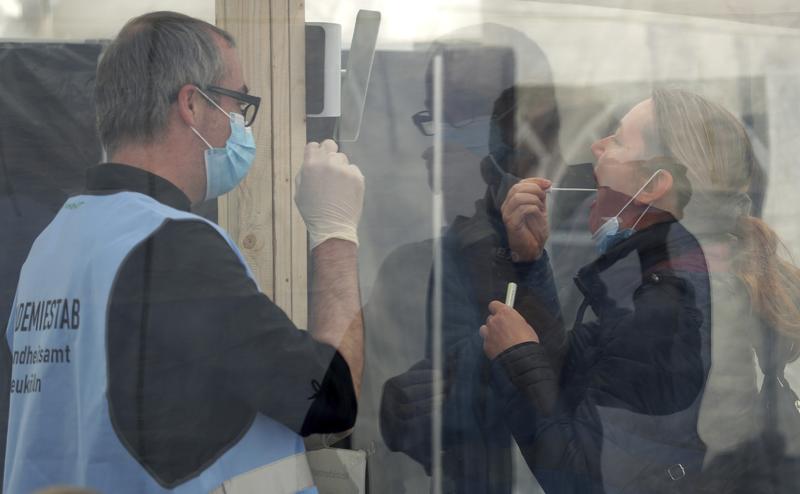 A staff member of the local health authority supports a woman using a new coronavirus test kit at a new drive-in testing center in Berlin, Germany, April 24, 2020. (MICHAEL SOHN / AP)
A staff member of the local health authority supports a woman using a new coronavirus test kit at a new drive-in testing center in Berlin, Germany, April 24, 2020. (MICHAEL SOHN / AP)
BERLIN — Germany changed course on Sunday over which type of smartphone technology it wanted to use to trace coronavirus infections, backing an approach supported by Apple and Google along with a growing number of other European countries.
Countries are rushing to develop apps to give a detailed picture of the risk of catching the coronavirus
Countries are rushing to develop apps to give a detailed picture of the risk of catching the coronavirus, as the chain of infection is proving hard to break because it can be spread by those showing no symptoms.
Chancellery Minister Helge Braun and Health Minister Jens Spahn said in a joint statement that Berlin would adopt a “decentralised” approach to digital contact tracing, thus abandoning a home-grown alternative that would have given health authorities central control over tracing data.
In Europe, most countries have chosen short-range Bluetooth “handshakes” between mobile devices as the best way of registering a potential contact, even though it does not provide location data.
But they have disagreed about whether to log such contacts on individual devices or on a central server - which would be more directly useful to existing contact tracing teams that work phones and knock on doors to warn those who may be at risk.
Under the decentralised approach, users could opt to share their phone number or details of their symptoms - making it easier for health authorities to get in touch and give advice on the best course of action in the event they are found to be at risk.
This consent would be given in the app, however, and not be part of the system’s central architecture.
APPLE REFUSED TO BUDGE
Germany as recently as Friday backed a centralised standard called Pan-European Privacy-Preserving Proximity Tracing (PEPP-PT), which would have needed Apple in particular to change the settings on its iPhones.
When Apple refused to budge there was no alternative but to change course, said a senior government source.
In their joint statement, Braun and Spahn said Germany would now adopt a “strongly decentralised” approach.
“This app should be voluntary, meet data protection standards and guarantee a high level of IT security,” they said. “The main epidemiological goal is to recognise and break chains of infection as soon as possible.”
Bluetooth-based smartphone contact tracing operates by assessing the closeness and length of contact between people and, if a person tests positive for COVID-19, telling recent contacts to call a doctor, get tested or self-isolate.
Early results in countries such as Singapore are modest, however, especially when set against the technology’s potential to redefine the relationship between state and individual.
An open letter from hundreds of scientists published last Monday warned that, if the contact tracing data was centralised, it would allow “unprecedented surveillance of society at large”.
The tide was already running against PEPP-PT and its main backer, German tech entrepreneur Chris Boos, as collaborators pulled out, faulting its methodology and its slowness to open up its work to wider scrutiny.
'GRAVE ERRORS'
One of the members of PEPP-PT, Germany’s Fraunhofer HHI research institute, was told on Saturday that it had been taken off the project, correspondence seen by Reuters showed.
ALSO READ: Merkel warns of virus-relapse risk as Germany eases curbs
“A series of grave errors were made by PEPP-PT regarding communication that, at the end of the day, caused serious damage and led to this decision,” Fraunhofer HHI head Thomas Wiegand said in a message to colleagues.
Germany’s reversal brings it into line with a proposal by Apple and Google, who said this month they would develop new tools to support decentralised contact tracing. In Europe, France and Britain still back centralisation.
Centralised apps would not work properly on Apple’s iPhone because, for Bluetooth exchanges to happen, the device would need to be unlocked with the app running in the foreground - a drain on the battery and an inconvenience to the user.
But the iPhone will integrate with decentralised protocols such as DP-3T, which has been developed by a Swiss-led team and has been backed by Switzerland, Austria and Estonia.
READ MORE: New infections in Germany rise by the most in 7 days
Backers of DP-3T, short for Decentralised Privacy-Preserving Proximity Tracing, say it is still possible for users voluntarily to opt in to sharing their phone number in order to pass epidemiologically useful data - although not location - to authorities to aid contact tracing. But this would be part of an app, not of the system architecture.
DP-3T, in a statement, welcomed Germany’s change of heart. PEPP-PT did not respond to requests for comment.


